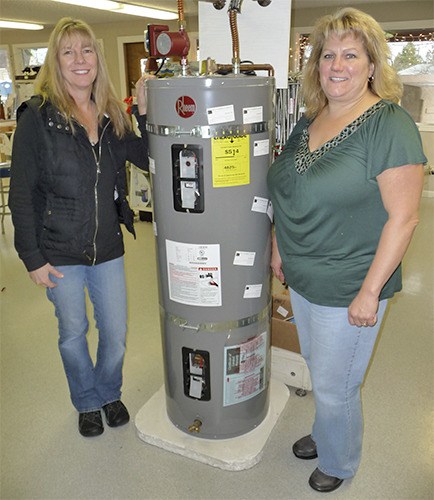If you own a standard water heater that’s at least 10 years old, you might want to start a dedicated savings account to pay for your next one. That’s because mandatory sweeping changes in the water heating industry take effect on April 16, 2015. Standard water heaters are being phased out to be replaced in the market by bigger, bulkier, more energy-efficient tanks and/or heat pumps.
Owner Judy Kimler and manager Karen Lewis of Bill’s Plumbing & Sanikan have been learning as much as they can about the Department of Energy’s mandate through the National Appliance Energy Conservation Act to pass along the ramifications to their customers and the general public.
“By April 16, companies will no longer make standard water heaters. They will be high-efficiency models,” Lewis said. “It will be an issue for modular homes with water heaters in closets or other tight spaces because the new 50-gallon water heaters will be two inches taller and two inches larger in diameter and there will be people who won’t have the room to get a new one.”
“Two inches is a big deal because modular homes can only fit a 19-inch diameter water heater,” Kimler said. “A lot of people will have to go down in size (capacity) or remodel and 19 inches is our most popular model by far.”
Kimler added that standard 65-gallon and 80-gallon water heaters will disappear from the market completely and homeowners who need these large capacity units will have to invest considerably more — perhaps triple — in a heat pump water heater.
“Anything 20-55 gallons will be required to be high-energy efficient; 50 gallons and below you’ll still be able to get in an energy-efficient water heater,” Lewis said. “The issue is having to resize it or remodel and the costs. Heat pumps need to be in a 10-foot by 10-foot room and they’re huge — 6.5 feet tall and 26 inches in diameter, so the cost of installation is considerably more because they’re so heavy.
“A typical installation is $1,300 for a standard 80-gallon but with a heat pump, an 80-gallon could be $2,500 just for the heat pump unit itself.”
The women said their four suppliers haven’t told them yet what their wholesale prices will be.
“We’re trying to bring in a good supply of standard water heaters to accommodate our customers but suppliers are only selling what’s left in their inventory, so they’re becoming hard to find. How many is enough?” Lewis shrugged.
They’ve also not been assured that a high-efficiency 40-gallon will fit in the space of a standard 50-gallon tank.
Kimler and Lewis stressed that they’re not against higher efficiency in water heaters — the electric ones are touted as saving $300 annually on electric bills — it’s the additional cost to relocate/remodel, downsize in capacity or purchase a much more expensive heat pump unit that concerns them for their customers.
“We’re working up an advertisement to be put in local newspapers to warn the general public about these changes,” Kimler said.
If you have questions, call Bill’s Plumbing & Sanikan at 683-7996, or contact another plumbing contractor.
Tankless water heater owners are in the clear because those units already meet the energy-efficiency requirements.



